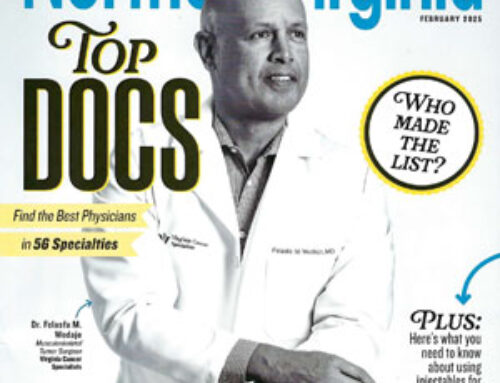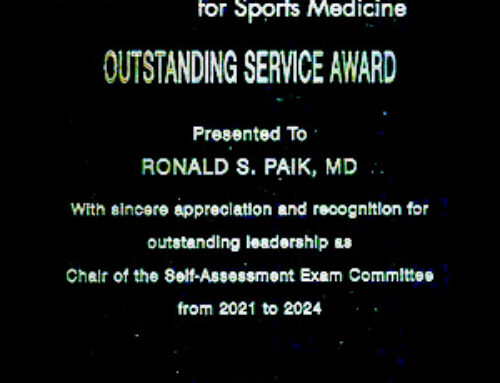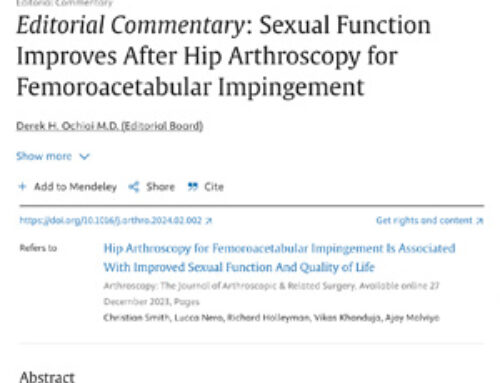Many times, the diagnosis of a hip labral tear is made by someone other than an orthopaedic surgeon. This could be your primary care doctor, OB/GYN doctor, physical therapist, chiropractor, or another health care provider. They might refer you to an orthopaedic surgeon for treatment of your hip pain. Nowadays, patients can choose which orthopaedic surgeon they see for definitive treatment of their hip condition.
On Social Media, one asked, “How do I know which surgeon is the best choice to treat my hip labral tear and FAI?” This article can give you some information and tips to make the best decision to treat your hip condition.
THINGS TO DO BEFORE MAKING AN APPOINTMENT WITH A DOCTOR
Is your doctor board certified or board eligible?
Being “board certified” by the AAOS (American Academy of Orthopaedic Surgeons) means that that surgeon has satisfied the requirements to present themselves as medical specialists in orthopaedic surgeon. The basic requirements are graduating from a recognized allopathic (MD) or osteopathic (DO) medical school, successfully completing an orthopaedic residency, and passing both a written examination (taken first) and then an oral examination after the surgeon has been in practice. Being “board eligible” means that the applicant has satisfied all of the above requirements except that they haven’t yet taken or passed the oral portion of the Board examination. If a surgeon is not board certified, that means they have either chosen not to undergo board certification testing or they were unable to pass the boards. Click on this link to find out whether your surgeon is board certified/eligible or not https://www7.aaos.org/member/directory/search.aspx?directory=public.
Is your doctor proficient in hip arthroscopy or hip preservation?
This is more difficult to determine. Currently, there is no equivalent to “board certified” to delineate hip arthroscopy specialists. Many highly qualified hip arthroscopy surgeons belong to ISHA-The Hip Preservation Society. This is an international society of medical specialists dedicated to hip preservation surgery, such as hip arthroscopy. Here is ISHA “Find a Surgeon” link https://ishasoc.net/dashboard/find-a-surgeon/.
Alternatively, your doctor may specialize in arthroscopy, which can include hip arthroscopy. Many arthroscopic surgeons belong to AANA (Arthroscopy Association of North America). If your doctor is a member of AANA, they are dedicated to high quality, cutting edge arthroscopic surgery. Here is AANA “Find a Doctor” link https://www.aana.org/AANAIMIS/Members/For_Patients/Find_a_Doctor/Members/For-Patients/Find-a-Doctor.aspx?hkey=ff99e176-f662-4eec-9820-05819019585f
One can also look on the doctor’s website, to see if they mention hip arthroscopy or have dedicated sections to hip arthroscopy and hip preservation. If they do, this is a clue that they do a fair amount of this type of surgery.
THINGS TO ASK AT YOUR VISIT
Once in the office, your doctor will re-examine your hip. It is possible that even though you were diagnosed with a hip labral tear and/or FAI, that this is not the cause of your pain. If the doctor examines you, and based on your specific condition, deems surgical treatment to be the best option, here are some general questions to ask.
How many hip arthroscopies do you do in a year?
The number of hip arthroscopies a surgeon does in a year is directly related to how many patients with hip conditions that he or she sees. If someone is a general orthopaedic surgeon, the number of potential hip arthroscopy candidate would be low. This does not mean that someone doing 20 hip arthroscopies per year is not qualified to do your surgery, but it can give you a sense of how expert they are in hip arthroscopy in particular. I did a study on the learning curve in hip arthroscopy, which showed surgeons who do greater than 50 hip arthroscopies per year planned their hip preservation surgeries differently than surgeons who did less than 50 hip arthroscopies per year. https://www.hindawi.com/journals/aos/2015/239601/
You said you’ll “fix my labrum”. What exactly does that mean?
Some surgeon will say that they will fix the problem of having a labral tear by trimming out the torn labrum. While in rare instances this may be most preferred, in most cases better outcomes are seen with labral repair, where arthroscopically anchors are placed into the bone, and the labrum is sewn back to the bone.
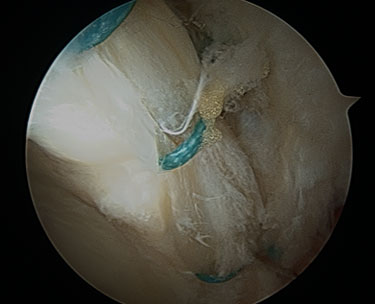
Figure 1: Picture of a labral repair. In the picture, there are three sutures that are anchored to the bone, sewing the labrum back to the acetabulum.
What do you do if the labrum is not repairable?
Any surgeon who does a high volume of hip arthroscopy sees patients whose hip labral tears are too degenerative or torn to sew back into place (because the labrum would not heal). Most high volume hip arthroscopy surgeons would then, in most cases, proceed with labral reconstruction, using a tendon graft to reconstruct the labrum.
Figure 2: Labral reconstruction: In this picture, the labrum was not repairable. Instead, a tendon was used as a graft, to reconstruct the labrum.
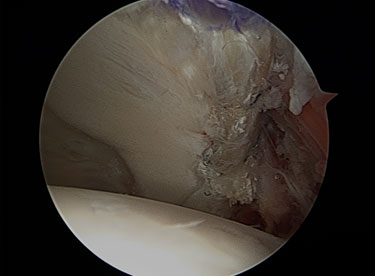
Figure 2: Labral reconstruction: In this picture, the labrum was not repairable. Instead, a tendon was used as a graft, to reconstruct the labrum.
Do you feel that you are the best person to do my surgery?
You may think that every doctor would say, “Of course I am the best to do your surgery!” However, this question can give you a lot of insight. We might be humble, but if pressed, we may state specific reasons why we are highly qualified for this particular surgery.
What do you feel about this article from this institution that states this?
This is a way of finding out how much your surgeon keeps up with the literature. You can choose a specific article of interest from a MAJOR orthopaedic journal (such as Journal of Arthroscopy or American Journal of Sports Medicine) published within the past year that relates specifically to your condition, and work that into a question. This can give you a sense of how up to date your surgeon is on the latest literature and research on hip arthroscopy.
THINGS TO DO AFTER YOUR VISIT
If you are thinking about hip arthroscopy with a specific surgeon, you could try to get opinions about that surgeon from people who are familiar with his or her work. One great resource would be local physical therapists. While they are not involved in the surgery itself, they have a great understanding of how patients of that surgeon recover. Physical therapists can be acutely aware of differences in patient outcomes between surgeons, even with exactly the same surgery.
A second opinion is always a good idea. Your surgeon should have no problem with you getting a second opinion (don’t worry about hurting someone’s feelings!). If both opinions concur, then you can be relatively confident you’re making the right decision to have surgery.
Derek Ochiai, MD
Nirschl Orthopaedic Center
1715 N. George Mason Drive, Suite 504
Arlington, VA, USA 22205
(703) 525-2200
Twitter: @DrDerekOchiai
Website: www.Nirschl.com

